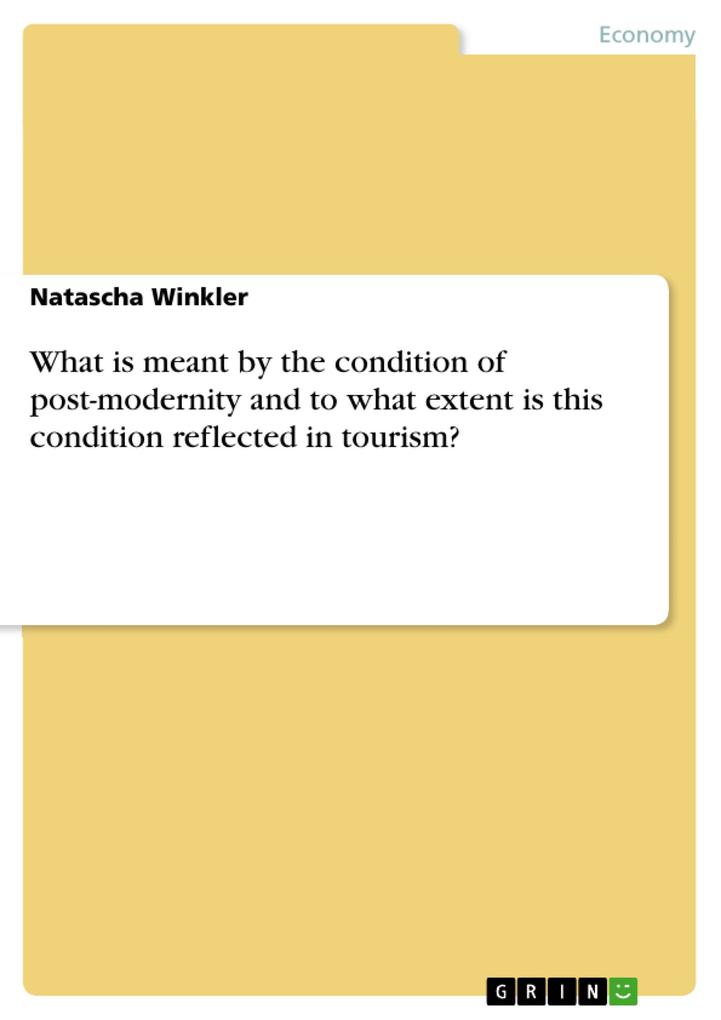
Sofort lieferbar (Download)
Document from the year 2007 in the subject Tourism - Miscellaneous, grade: 70 %, University of Lincoln, course: Consumer Culture and Tourism, language: English, abstract: This essay investigates the meaning of the condition of post-modernity today and how it is reflected in tourism.
Post-modernity is a term that is difficult to clarify and often there are different statements amongst sociologists whether at all this term exists or not (Urry, 2002; Atkinson, 2002; Sharpley, 1994; Williams and Sewpaul, 2004). In general the advocates of Post-modernity say that it can be seen in many different conditions as e. g. in art, literature, architecture and the social condition of society. As the term appears in almost all aspects of science and areas of life, just the main characteristics and its connection with tourism will be outlined in this work. The term post-modernity suggests that there must have been a break of an earlier epoch and therefore a new era must have begun afterwards. The sociologists do not agree with each other when the condition of post-modernity really began. Lyotard (1984) believes in contrast to many others that this change of society and culture is in progress at least since the 1950ies, whereas Harvey (1989) says he found evidence for a shift of cultural change in newspapers and journals in the 1970ies.
However, to understand what kind of changes have taken place in the last decades the author will first outline the main characteristics of modernity.
The development of modernity started in the sixteenth and seventeenth centuries when society made an enormous progress in agriculture, science and industry. The term modernity as a social condition was not implemented back then. However, due to this progress and therefore a rise in knowledge, society believed in science and was looking forward to the future. These so called Enlightenment thinkers foresaw the victory of scientific development and knowledge. Society started to abandon everything that was linked to traditions and the past. The society of mass production and mass consumption had emerged.
During the time of modernity society also separated themselves from others by class, gender, race, occupation and wealth, a society of differentiation emerged (Sharpley, 1994). There have been high distinctions between high culture, people who where wealthy and therefore had access to cultural events and knowledge, and the low culture, which have been ordinary, working people.
To get a short insight of what modernism was like it may now be easier to understand what is meant with the condition of post modernity.
Post-modernity is a term that is difficult to clarify and often there are different statements amongst sociologists whether at all this term exists or not (Urry, 2002; Atkinson, 2002; Sharpley, 1994; Williams and Sewpaul, 2004). In general the advocates of Post-modernity say that it can be seen in many different conditions as e. g. in art, literature, architecture and the social condition of society. As the term appears in almost all aspects of science and areas of life, just the main characteristics and its connection with tourism will be outlined in this work. The term post-modernity suggests that there must have been a break of an earlier epoch and therefore a new era must have begun afterwards. The sociologists do not agree with each other when the condition of post-modernity really began. Lyotard (1984) believes in contrast to many others that this change of society and culture is in progress at least since the 1950ies, whereas Harvey (1989) says he found evidence for a shift of cultural change in newspapers and journals in the 1970ies.
However, to understand what kind of changes have taken place in the last decades the author will first outline the main characteristics of modernity.
The development of modernity started in the sixteenth and seventeenth centuries when society made an enormous progress in agriculture, science and industry. The term modernity as a social condition was not implemented back then. However, due to this progress and therefore a rise in knowledge, society believed in science and was looking forward to the future. These so called Enlightenment thinkers foresaw the victory of scientific development and knowledge. Society started to abandon everything that was linked to traditions and the past. The society of mass production and mass consumption had emerged.
During the time of modernity society also separated themselves from others by class, gender, race, occupation and wealth, a society of differentiation emerged (Sharpley, 1994). There have been high distinctions between high culture, people who where wealthy and therefore had access to cultural events and knowledge, and the low culture, which have been ordinary, working people.
To get a short insight of what modernism was like it may now be easier to understand what is meant with the condition of post modernity.
Produktdetails
Erscheinungsdatum
09. Februar 2007
Sprache
englisch
Seitenanzahl
13
Dateigröße
0,42 MB
Autor/Autorin
Natascha Winkler
Verlag/Hersteller
Kopierschutz
ohne Kopierschutz
Produktart
EBOOK
Dateiformat
PDF
ISBN
9783638609449
Entdecken Sie mehr
Bewertungen
0 Bewertungen
Es wurden noch keine Bewertungen abgegeben. Schreiben Sie die erste Bewertung zu "What is meant by the condition of post-modernity and to what extent is this condition reflected in tourism?" und helfen Sie damit anderen bei der Kaufentscheidung.









